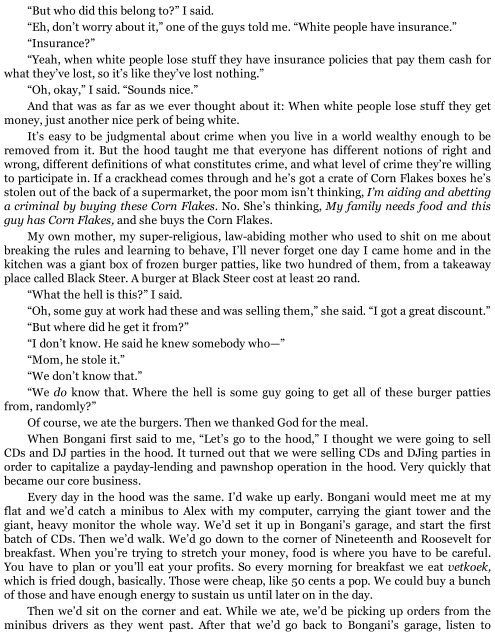You also want an ePaper? Increase the reach of your titles
YUMPU automatically turns print PDFs into web optimized ePapers that Google loves.
“But who did this belong to?” I said.<br />
“Eh, don’t worry about it,” one of the guys told me. “White people have insurance.”<br />
“Insurance?”<br />
“Yeah, when white people lose stuff they have insurance policies that pay them cash for<br />
what they’ve lost, so it’s like they’ve lost nothing.”<br />
“Oh, okay,” I said. “Sounds nice.”<br />
And that was as far as we ever thought about it: When white people lose stuff they get<br />
money, just another nice perk of being white.<br />
It’s easy to be judgmental about crime when you live in a world wealthy enough to be<br />
removed from it. But the hood taught me that everyone has different notions of right and<br />
wrong, different definitions of what constitutes crime, and what level of crime they’re willing<br />
to participate in. If a crackhead comes through and he’s got a crate of Corn Flakes boxes he’s<br />
stolen out of the back of a supermarket, the poor mom isn’t thinking, I’m aiding and abetting<br />
a criminal by buying these Corn Flakes. No. She’s thinking, My family needs food and this<br />
guy has Corn Flakes, and she buys the Corn Flakes.<br />
My own mother, my super-religious, law-abiding mother who used to shit on me about<br />
breaking the rules and learning to behave, I’ll never forget one day I came home and in the<br />
kitchen was a giant box of frozen burger patties, like two hundred of them, from a takeaway<br />
place called Black Steer. A burger at Black Steer cost at least 20 rand.<br />
“What the hell is this?” I said.<br />
“Oh, some guy at work had these and was selling them,” she said. “I got a great discount.”<br />
“But where did he get it from?”<br />
“I don’t know. He said he knew somebody who—”<br />
“Mom, he stole it.”<br />
“We don’t know that.”<br />
“We do know that. Where the hell is some guy going to get all of these burger patties<br />
from, randomly?”<br />
Of course, we ate the burgers. Then we thanked God for the meal.<br />
When Bongani first said to me, “Let’s go to the hood,” I thought we were going to sell<br />
CDs and DJ parties in the hood. It turned out that we were selling CDs and DJing parties in<br />
order to capitalize a payday-lending and pawnshop operation in the hood. Very quickly that<br />
became our core business.<br />
Every day in the hood was the same. I’d wake up early. Bongani would meet me at my<br />
flat and we’d catch a minibus to Alex with my computer, carrying the giant tower and the<br />
giant, heavy monitor the whole way. We’d set it up in Bongani’s garage, and start the first<br />
batch of CDs. Then we’d walk. We’d go down to the corner of Nineteenth and Roosevelt for<br />
breakfast. When you’re trying to stretch your money, food is where you have to be careful.<br />
You have to plan or you’ll eat your profits. So every morning for breakfast we eat vetkoek,<br />
which is fried dough, basically. Those were cheap, like 50 cents a pop. We could buy a bunch<br />
of those and have enough energy to sustain us until later on in the day.<br />
Then we’d sit on the corner and eat. While we ate, we’d be picking up orders from the<br />
minibus drivers as they went past. After that we’d go back to Bongani’s garage, listen to
















